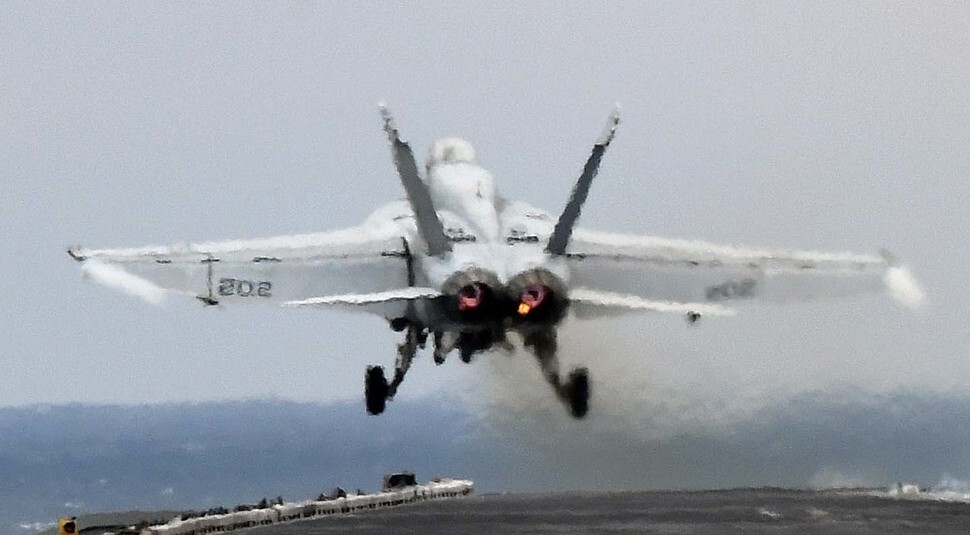hankyoreh
Links to other country sites 다른 나라 사이트 링크
US experts argue in favor of scaling down S. Korea-US military exercises

Some domestic observers have been arguing the proposal of a reduction in joint South Korea-US military exercises in exchange of for a North Korean nuclear freeze by President Moon Jae-in’s special aide for unification, foreign affairs, and security Moon Chung-in, is potentially compromising to the South Korea-US alliance. But even many US experts are arguing the need to scale down the exercises, citing the practical need to prevent Pyongyang from achieving advanced nuclear and missile capabilities.
While attending a seminar in Washington June 13, former US Secretary of Defense William Perry, 89, responded to questions on the proposed halt to joint South Korea-US military exercises in exchange for a North Korean nuclear and missile freeze. In his response, Perry said the idea was “worth considering” from Washington’s perspective, but that “South Korea might not accept it” - suggesting public opinion in South Korea might be a bigger issue than the US.
Perry also addressed the possibility of a halt to joint exercises during a talk with reporters in Washington in January, saying it would be better not to provide a halt as a precondition to negotiations but suggesting it could be put on the table once serious negotiations have begun.
Similar arguments were made to the Washington Post in Sept. 2016 by Jane Harman, director of the Woodrow Wilson Center, and James Person, coordinator of the its Center for Korean History and Public Policy, while a fierce debate was taking place over the new US administration’s North Korea policy.
In their contributions, Harman and Person stressed the need for additional flexibility from Washington - the proverbial carrot in addition to the stick. In particular, they proposed that a halt to joint South Korea-US military exercises should be considered if it would mean “meaningful progress.” The Wilson Center is influential enough to be considered among the US’s four top think tanks.
In the June 16 edition of the East Asia foreign affairs and national security journal Nelson Report, International Institute for Strategic Studies-Americas executive director Mark Fitzpatrick responded to Moon Chung-in’s remarks by saying a reduction of the exercises’ scale was within the realm of possibility, though not a halt as proposed as China. Other experts expressed critical views in the journal, but the opinions were not uniformly negative.
The biggest concern among experts was that the growing scale of joint military exercises has increased the potential for misunderstanding by Pyongyang. Robert Litwak, director of international security studies for the Wilson Center, told the Hankyoreh in a March interview that exercises “[may look] like a defensive maneuver for us, [but] from North Korea‘s perspective, they may think we’re preparing an attack when you start bringing B2 fighters.”
“We need to reassure South Korea that we will be a reliable ally,” Litwak added.
“But we also have to reassure North Korea in a way. . . . We know from history how wars start.”
By Yi Yong-in, Washington correspondent
Please direct questions or comments to [english@hani.co.kr]

Editorial・opinion
![[Column] Season 2 of special prosecutor probe may be coming to Korea soon [Column] Season 2 of special prosecutor probe may be coming to Korea soon](https://flexible.img.hani.co.kr/flexible/normal/500/300/imgdb/original/2024/0426/3317141030699447.jpg) [Column] Season 2 of special prosecutor probe may be coming to Korea soon
[Column] Season 2 of special prosecutor probe may be coming to Korea soon![[Column] Park Geun-hye déjà vu in Yoon Suk-yeol [Column] Park Geun-hye déjà vu in Yoon Suk-yeol](https://flexible.img.hani.co.kr/flexible/normal/500/300/imgdb/original/2024/0424/651713945113788.jpg) [Column] Park Geun-hye déjà vu in Yoon Suk-yeol
[Column] Park Geun-hye déjà vu in Yoon Suk-yeol- [Editorial] New weight of N. Korea’s nuclear threats makes dialogue all the more urgent
- [Guest essay] The real reason Korea’s new right wants to dub Rhee a founding father
- [Column] ‘Choson’: Is it time we start referring to N. Korea in its own terms?
- [Editorial] Japan’s rewriting of history with Korea has gone too far
- [Column] The president’s questionable capacity for dialogue
- [Column] Are chaebol firms just pizza pies for families to divvy up as they please?
- [Column] Has Korea, too, crossed the Rubicon on China?
- [Correspondent’s column] In Japan’s alliance with US, echoes of its past alliances with UK
Most viewed articles
- 1Samsung subcontractor worker commits suicide from work stress
- 2Division commander ordered troops to enter raging flood waters before Marine died, survivor says
- 3‘We must say no’: Seoul defense chief on Korean, USFK involvement in hypothetical Taiwan crisis
- 4No good, very bad game for Korea puts it out of Olympics for first time since 1988
- 5[Column] Season 2 of special prosecutor probe may be coming to Korea soon
- 6[Editorial] Korea’s surprise Q1 growth requires objective assessment, not blind fanfare
- 7Korea’s 1.3% growth in Q1 signals ‘textbook’ return to growth, says government
- 8US overtakes China as Korea’s top export market, prompting trade sanction jitters
- 9[Column] Has Korea, too, crossed the Rubicon on China?
- 1046% of cases of violence against women in Korea perpetrated by intimate partner, study finds